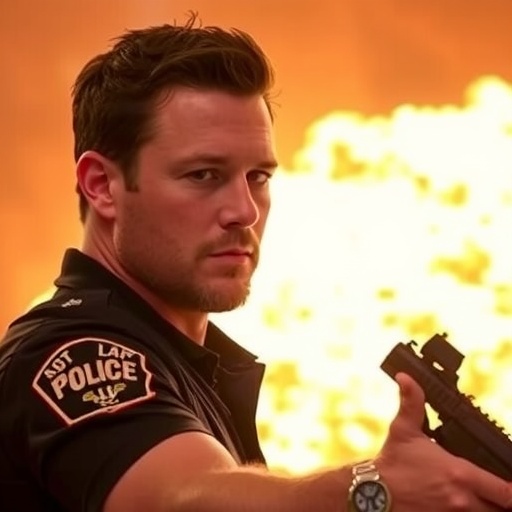Chris Pratt Opens Up About Intense LAPD Homicide Training for Thriller ‘Mercy’
In a candid interview that has Hollywood buzzing, Chris Pratt has pulled back the curtain on his exhaustive preparation for the role of a jaded LAPD detective in the upcoming thriller Mercy. The star, known for his blockbuster hits like Guardians of the Galaxy and Jurassic World, revealed that he spent months shadowing real-life Los Angeles Police Department (LAPD) homicide detectives, immersing himself in the gritty realities of crime scene investigations and high-stakes pursuits. “It wasn’t just about learning the badge; it was about feeling the weight of every decision,” Pratt shared, emphasizing the emotional and physical toll that shaped his performance in this gripping film set to hit theaters next year.
- Shadowing LAPD Detectives: Pratt’s Crash Course in Homicide Realities
- Building the Physique: Pratt’s Rigorous Training for Detective Demands
- Unpacking the Emotional Core: Pratt on the Psychological Weight of ‘Mercy’
- Production Buzz and Collaborations: Inside the Making of ‘Mercy’
- Future Spotlights: Pratt’s Thriller Turn and ‘Mercy’ Release Hype
Pratt’s dedication comes at a pivotal time in his career, as he transitions from larger-than-life superheroes to more grounded, character-driven roles. Directed by acclaimed filmmaker Tim Miller—known for Deadpool—Mercy promises to be a pulse-pounding exploration of justice, corruption, and personal redemption within the LAPD’s ranks. With production wrapping up in Los Angeles, insiders are already hailing it as one of Pratt’s most transformative projects. But what drove the actor to such extremes? Pratt’s revelations offer a window into the meticulous world-building that defines modern thrillers.
Shadowing LAPD Detectives: Pratt’s Crash Course in Homicide Realities
Chris Pratt didn’t just read scripts or watch documentaries for Mercy; he dove headfirst into the LAPD’s homicide division, spending over 12 weeks embedded with active investigators. This hands-on approach allowed him to witness firsthand the meticulous process of piecing together clues from blood-soaked crime scenes to tense interrogations. “I was there for ride-alongs during night shifts, seeing how a single overlooked detail can make or break a case,” Pratt recounted in an exclusive sit-down with Variety. The LAPD, which handles over 300 homicides annually in Los Angeles alone according to department statistics, provided Pratt with unprecedented access, a rarity for Hollywood productions due to strict protocols.
One particularly harrowing experience involved observing an actual autopsy at the Los Angeles County Coroner’s Office, a partner facility to the LAPD. Pratt described the sterile chill of the room and the clinical detachment required of forensic teams as profoundly unsettling. “It’s not glamorous like in the movies—it’s raw, methodical, and heartbreaking,” he said. To prepare, Pratt consulted with veteran detectives like Sergeant Maria Gonzalez, who has 25 years on the force and served as a technical advisor for the film. Gonzalez praised Pratt’s commitment, noting, “He asked questions that showed he truly wanted to honor the job, not sensationalize it.” This collaboration ensured that Mercy‘s portrayal of police work rings true, from the procedural paperwork that consumes 70% of a detective’s time to the adrenaline-fueled chases through LA’s sprawling urban landscape.
The LAPD’s involvement extends beyond training; the department has a history of partnering with films to promote accurate depictions, as seen in movies like End of Watch and Training Day. For Mercy, this meant Pratt learning authentic jargon—terms like “perp walk” and “DB” (dead body)—and even practicing handcuffing techniques on dummies provided by the LAPD academy. Such details are crucial in a thriller genre where audiences crave realism amid the suspense. Pratt’s immersion paid off, with early script revisions incorporating real case insights, like the psychological strain of unsolved murders that haunt detectives for years.
Building the Physique: Pratt’s Rigorous Training for Detective Demands
Beyond the mental grind, Chris Pratt underwent a grueling physical regimen tailored to the demands of an LAPD thriller. For Mercy, his character navigates intense action sequences, including rooftop pursuits and hand-to-hand combat, requiring a lean, tactical build rather than the bulked-up heroism of his Marvel days. Pratt worked with stunt coordinator Wade Eastwood, who has trained stars for films like John Wick, focusing on functional strength over aesthetics. “We simulated SWAT drills and defensive tactics used by LAPD’s Metropolitan Division,” Pratt explained, detailing sessions that included obstacle courses mimicking LA’s diverse terrains—from Hollywood Hills to South Central streets.
The actor’s routine was punishing: five days a week of mixed martial arts, weight training, and cardiovascular endurance, clocking in at four hours daily. He shed 15 pounds from his Jurassic World frame to embody a detective weathered by years on the job, incorporating LAPD-inspired workouts like the department’s physical agility test (PAT). This test, which all officers must pass, involves push-ups, a 500-yard run, and stair climbs—elements Pratt replicated to build stamina for long shooting days. Nutrition played a key role too; Pratt followed a high-protein diet advised by LAPD fitness experts, emphasizing recovery foods to combat the inflammation from simulated injuries.
Physical preparation wasn’t without risks. During one training exercise, Pratt sustained a minor ankle sprain while practicing vehicle extractions, a common LAPD tactic for high-risk arrests. “It reminded me that these cops put their bodies on the line every day,” he reflected. The film’s production team integrated this authenticity by filming on actual LAPD ranges in the San Fernando Valley, where Pratt fired department-issued Beretta pistols under supervision. Such realism elevates Mercy above typical thrillers, blending heart-pounding action with the tangible exhaustion of law enforcement life. Pratt’s transformation has sparked comparisons to his Zero Dark Thirty audition days, signaling a return to roles that demand both brawn and vulnerability.
Unpacking the Emotional Core: Pratt on the Psychological Weight of ‘Mercy’
While the physicality of Mercy grabbed headlines, Chris Pratt emphasized the emotional undercurrents that define his detective character. Portraying a man grappling with departmental corruption and personal loss, Pratt drew from real LAPD stories of burnout and moral ambiguity. “Homicide work isn’t just solving cases; it’s carrying ghosts,” he said, citing interviews with officers who spoke of PTSD rates as high as 20% among LAPD personnel, per a 2022 department wellness report. To capture this, Pratt underwent method acting sessions with psychologist Dr. Elena Vasquez, who specializes in trauma therapy for first responders.
One pivotal scene in the film involves Pratt’s character confronting a betrayal that mirrors real LAPD scandals, like the 1990s Rampart Division controversy involving officer misconduct. Pratt spent hours reviewing declassified files and speaking with affected families, which left him emotionally drained. “I cried after some of those talks—not for show, but because their pain is so real,” he admitted. This depth is what sets Mercy apart in the thriller landscape, where emotional resonance can elevate a plot twist into something profound. Co-star Rebecca Ferguson, playing a fellow detective, echoed Pratt’s intensity: “Chris brought a raw honesty that made every scene feel lived-in.”
The film’s narrative weaves these threads into a taut storyline: Pratt’s detective uncovers a conspiracy threatening the city’s underbelly, forcing him to question his oath. Pratt’s preparation included journaling from his character’s perspective, a technique he honed for The Tomorrow War, to internalize the isolation of the job. LAPD Chief Michel Moore commended the approach, stating in a press release, “Projects like Mercy humanize our officers’ struggles.” As thrillers evolve post-True Detective, Pratt’s role positions him as a leading man capable of blending spectacle with soul-searching drama.
Production Buzz and Collaborations: Inside the Making of ‘Mercy’
As Mercy nears completion, the production’s collaborative spirit is generating Oscar whispers for its screenplay by newcomer Alex Rivera, inspired by LAPD cold cases. Filming spanned 85 days across Los Angeles landmarks, from the bustling LAPD headquarters in downtown to shadowy alleys in Echo Park, capturing the city’s dual nature as a dream factory and crime hub. Budgeted at $80 million, the film boasts a stellar ensemble: alongside Pratt and Ferguson, it features Oscar nominee John C. Reilly as a grizzled captain and rising star Ayo Edebiri in a pivotal informant role.
Director Tim Miller’s vision for Mercy emphasizes practical effects over CGI, a nod to LAPD’s grounded reality. “We used real police cruisers and helicopters for authenticity,” Miller revealed at a recent industry panel. Pratt’s chemistry with the cast was forged in LAPD-simulated team-building exercises, including scenario role-plays that tested their improv skills under pressure. Post-production is underway at Pinewood Studios, with composer Hans Zimmer reportedly scoring the thriller’s tense underscore, blending orchestral swells with urban percussion to mirror LAPD sirens.
Marketing for Mercy is ramping up, with a teaser trailer slated for the Super Bowl, leveraging Pratt’s 50 million Instagram followers for viral potential. The LAPD’s endorsement includes promotional tie-ins, like public safety PSAs featuring cast members. This synergy not only boosts the film’s profile but also raises awareness about officer mental health, with proceeds from premieres supporting LAPD wellness programs. As Hollywood grapples with portraying law enforcement amid social debates, Mercy aims to strike a balanced chord, celebrating heroism while acknowledging flaws.
Future Spotlights: Pratt’s Thriller Turn and ‘Mercy’ Release Hype
Chris Pratt’s foray into Mercy marks a strategic pivot, building on his thriller credentials from The Terminal List on Prime Video, which drew 1.5 billion minutes viewed in its first week. Industry analysts predict Mercy could gross over $200 million globally, capitalizing on Pratt’s box-office draw—his films have surpassed $10 billion worldwide. The actor’s next projects, including a Garfield voice role and potential MCU return, underscore his versatility, but Mercy cements his dramatic chops.
Fans are already dissecting leaked set photos, speculating on plot twists involving a serial killer with ties to city hall. Release is targeted for summer 2025, positioning it against blockbusters like Avatar 3, where Mercy‘s intimate scale could shine. Pratt teased, “This film’s about mercy in a merciless world—expect twists that’ll keep you up at night.” As anticipation builds, Mercy not only spotlights Pratt’s evolution but also invites broader conversations on policing in America, ensuring its cultural ripple long after the credits roll.
With the LAPD thriller genre resurging—evidenced by successes like Reacher—Pratt’s preparation sets a new benchmark for authenticity. Whether through awards contention or word-of-mouth buzz, Mercy is poised to redefine how Hollywood tackles real-world heroes, leaving audiences questioning the thin blue line between justice and vengeance.








